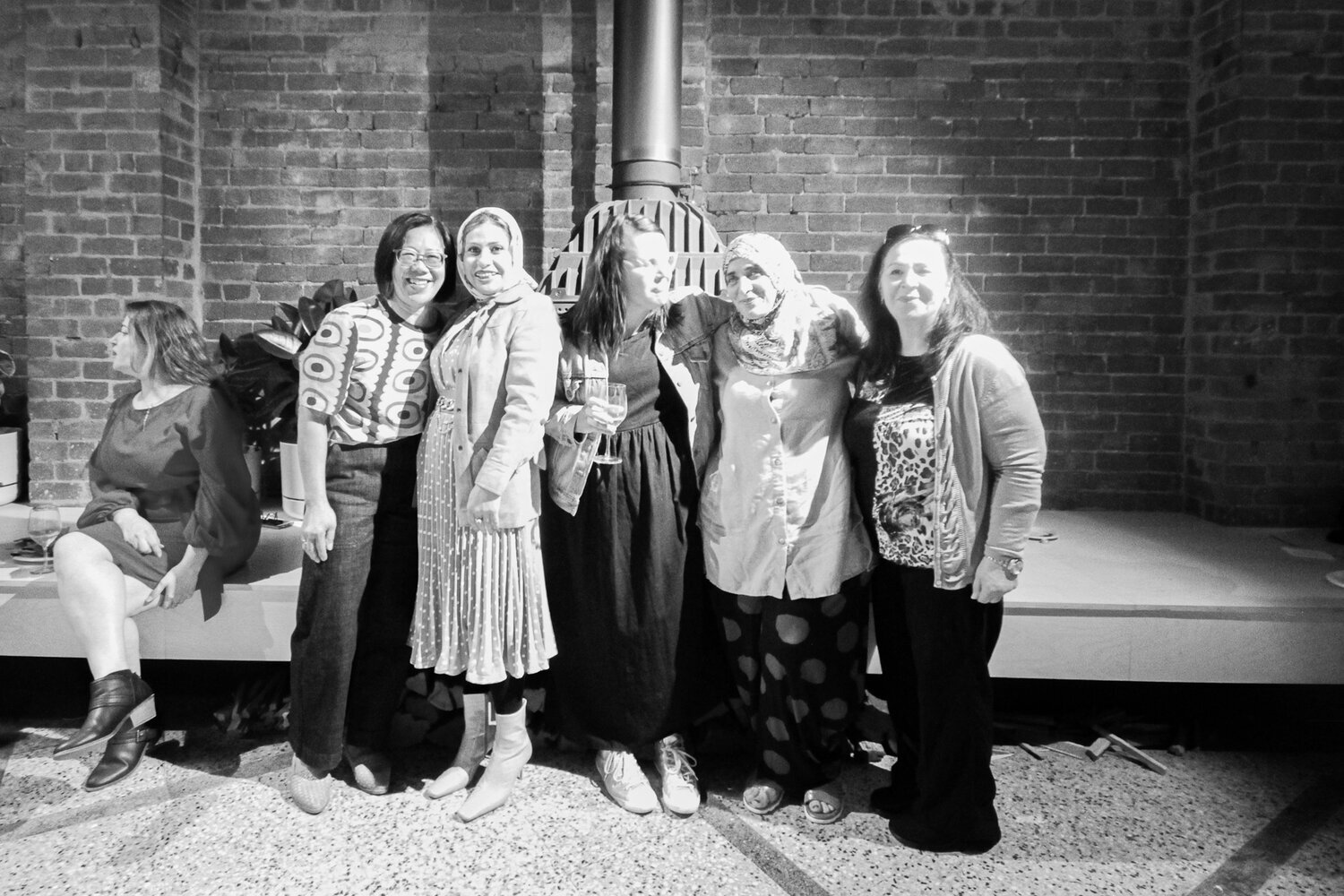FREE TO FEED’S FIVE PROGRAM VALUES
“WE MAKE A COMMITMENT TO UNCONDITIONAL POSITIVE REGARD.”
Our Program Manager Kathy Share is a highly experienced mental health professional with a strong background in leading complex interventions and programs. Since her arrival at Free to Feed late last year Kathy has been an instrumental key figure in implementing our trauma-informed Participant Program. Daily, she works alongside our Participant Support Worker Rhiannon and together they are a pillar of support for our participants. Today, she talks us through the values of Free to Feed’s Program and the models of care employed at all levels of our organisation to deliver critical support and a welcoming environment.
The participants at Free to Feed are the beating heart, our obvious piece de resistance. Each participant warmly and generously invites the people of Melbourne to learn so much, from the quick sarcastic wit of Iraqi women, the glamour of Persian femmes and the generosity of Malaysian-Chinese hospitality.
Those of us at Free to Feed who are lucky enough to share a morning coffee with our participants absorb and relish in daily gestures of warmth, softness and determination. Our Participants deserve environments that allow space to live and breathe. Due to being People Seeking Asylum and Refugees, they have had their identities, personhood and experiences politicised and projected onto them. This can often lead to a reduced public perception that centres not on the person but the public narrative.
Verena, Kathy, Tayebeh at Sarah and Halima’s Eid al-Fitr Feast.
Sarah and her children hosting Eid al-Fitr with close family and friends of Free to Feed!
“OUR PARTICIPANTS DESERVE ENVIRONMENTS THAT ALLOW SPACE TO LIVE AND BREATHE.”
This reduction leads to the removal of space to exist. This happens in big ways such as inaccessible public services, hiring structures that favour the familiar and extremely long waitlists for under-resourced English classes. These experiences layered on top of the well-documented trauma experienced by people seeking asylum and refugees can make day to day experiences feel quite unsafe.
To do what we can across our workspaces, we have outlined program values that are designed from research and evidence. These values work to acknowledge what our participants could be experiencing. We continually work to embed these values into our kitchens and environments, so that our participants can experience a space that has considered them and gives them the freedom to be.
OUR PROGRAM VALUES
UNIVERSAL TRAUMA PRECAUTIONS
We sow Universal Trauma Precautions into all contact points with participants. This is designed in acknowledgement of the generational and systemic experiences of trauma typically experienced by people seeking asylum and refugees. These precautions acknowledge physical and psychological safety, choice, control, collaboration and empowerment. Our participant-facing staff sit together regularly to identify how these can be real and permeable illustrations rather than abstract concepts.
All participant facing staff at Free to Feed regularly sit and identify how safety, choice, control, collaboration and empowerment can be woven into every interaction with participants.
UNCONDITIONAL POSITIVE REGARD
We make a commitment to Unconditional Positive Regard. This is an attitude and an approach that centres warmth, respect and acceptance in each of our interactions with our participants. This works to champion their strengths and contributions. When this approach is implemented across our teams, it increases confidence and helps our participants to build positive regard towards themselves. This works meaningfully to counteract internalised narratives of conditional worth or respect
CULTURAL HUMILITY
We practice sitting with Cultural Humility. This looks like our staff reflecting on their own sense of culture and its implicit biases and assumptions. This is an internal discipline that we adopt by fostering curiosity, expecting nuance and promoting the agency of our participants in their menu and recipe development. This helps keep us accountable to the fact that each individual culture will always be unknowable to us and that the best narrator will be the individual participant that identifies to be of that culture.
L-R Sonia (Kitchen Manager & Trainer), Shahnaz (FtF Alumni), Nikki (Chef), Aheda and Mahshid (Free to Feed Alumni).
Nige and Bianca! Behind the scenes of All Together Now - Cooking Sri Lankan With Nige.
“EACH INDIVIDUAL CULTURE WILL ALWAYS BE UNKNOWABLE TO US, THE BEST NARRATOR WILL BE THE INDIVIDUAL PARTICIPANT...”
SAFE ENVIRONMENTS
A Culturally Safe Environment is critical at Free to Feed. This can only be defined and measured by our participants. We refer to culture as age, physical ability, gender identification and sexual orientation. Implementing both robust and regular practices of cultural safety ensure that there is dignity, access and ease of participation within the culture of Free to Feed itself.
A STRENGTHS-BASED APPROACH
We apply a Strengths-Based Approach in all that we do, an approach that is grounded in resilience theory. We acknowledge the resources that individuals use to overcome adversity and trauma to further increase positive outcomes in all aspects of their lives. These resources can be internal such as a skill set, an outlook or a sense of humour. They may also be external and located in the utilisation of their relationships, services or religious communities.
“I feel both connected to my culture and connected to Melbourne when I cook my food at Free to Feed” – Zina, Free to Feed Cooking Instructor in 2021.
Our participants have many strengths and skills and resources, our Program seeks to acknowledge internal and external strengths such as outlook, sense of humour or relationships.
We are absolutely committed to learning, growing and evolving our programs. With the knowledge that the best people to do that are those with lived experience themselves. The future of programs at Free to Feed is an exciting place. It’s bright and alive with our participants at the centre and at the helm of the decisions. Do come and join us on the journey!
Kathy x








